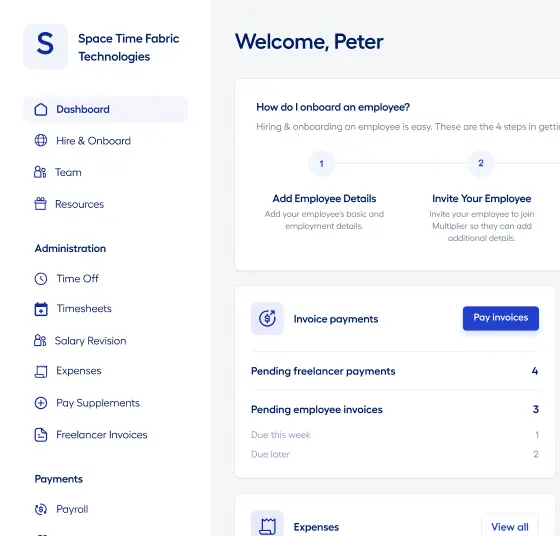A look at the top business entity types
Different types of business entities have different rules and regulations. For instance, partnership entities are run by two or more individuals who share assets, liabilities, responsibilities, and risks. This is not the case with sole proprietorship, which has only one owner. It is time to understand the ground rules applicable to the various types.1. Sole Proprietorship
The sole proprietorship entity type is the simplest. You run the business yourself. There is only a single owner and decision maker. You cannot have any investors and don’t have to file articles of incorporation. If you choose sole proprietorship as the business entity type, the IRS treats you and the business as one and the same. Examples of sole proprietorship businesses can be freelancers, consultants, and other professional service providers who work as sole proprietors.2. Partnership
The main difference between a sole proprietorship and a partnership is that there is only one owner in a sole proprietorship. In contrast, in a partnership, more than one partner is involved, and they enter into a partnership agreement. A partnership business can be either General partnership or Limited Partnership.3. Limited Liability Company (LLC)
LLC can be a single-member LLC or a multi-member LLC. The members are the owners of the company, just like partners in the previous instance. Income benefits in LLCs are more like partnership businesses. They have operational flexibility. But they also have limited liability exposure. However, this type of business entity seems more like a limited partnership. There are statutory and legal differences to it.4. C Corporation
C Corporation is a legal type of business entity that operates under the state law, and whose owners and shareholders are taxed separately from the entity. The best examples of C corporations are Microsoft and Walmart. C-corps are considered to provide best protection from personal liabilities. However, it is also the most elaborate of business structures and may consist of shareholders, a board of directors, and officials, who decide the company’s course of action. A corporation has quite a complex structure that requires more documentation, operational processes, record-keeping, tax compliance, and reporting. For corporation type of entity business, you must file the Articles of Incorporation with the state. To file taxes, C Corporation needs to file taxes on the profit and loss using Form 1120.5. S Corporation
An S corporation is a type of closed corporation, which means the corporation is held by a finite number of shareholders and does not have public trading. This type of business entity provides limited liability, like C Corporation. But S Corporations are pass-through entities for tax purposes. That means, S Corporation’s profits and losses pass through the personal tax returns of the shareholders. There are many regulations around the S corporation, from a limited number of shareholders to the fact that a C Corporation cannot be a shareholder. The taxes are filed through Form 1120S and do not have corporate-level taxes. Also note, for S Corporation, the shareholders have to be US citizens/residents.11 Challenges of operating business entity
Operating a business entity (such as a corporation or limited liability company) comes with its own set of challenges. Here are some of the most commonly experienced associated with having a business entity rather than using an EOR:
- Compliance Issues: Business entities must adhere to various legal and regulatory requirements, including tax filings, employment laws, and corporate governance. Staying compliant can be complex and time-consuming. Failure to comply with regulatory requirements can result in legal disputes, fines, or even the dissolution of the business.
- Administrative Paperwork: In association to above compliance, maintaining business records, contracts, and financial documents can be burdensome, and failure to do so can result in legal and financial consequences.
- Cost of Initial Setup: Establishing and maintaining a business entity often involves significant upfront costs, including legal fees, registration fees, and ongoing operational expenses.
- Ongoing Expenses: Business entities have ongoing costs like rent, utilities, insurance, and salaries that may add up to a hefty amount, making the expenses go off the roof.
- Personal Legal Liability: Business owners may have personal liability for business debts and legal issues, particularly in sole proprietorships and general partnerships. This means personal assets could be at risk.
- HR and Payroll Management Complexity: Businesses must handle HR functions, including recruitment, onboarding, employee benefits, and performance management, which can be challenging and time-consuming. Handling these along with the processing of payroll, tax calculations, and staying current with tax code changes can be complex and require great effort.
- International Expansion Challenges: If your business plans to expand internationally, setting up and managing entities in different countries can be highly complex due to varying legal and tax structures in different regions.
- Limited Flexibility: Business entities have less flexibility when it comes to quickly scaling up or down based on changing business needs, as compared to using an EOR that can handle workforce changes more fluidly.
- Time-Consuming: Managing a business entity requires significant time and attention, which can detract from the core activities of running and growing the business.
- Tax Complexity: Business entities need to navigate complex tax regulations, potentially facing higher tax rates, and managing deductions and credits can be intricate.
- Exit Strategy: Exiting or selling a business entity can be a lengthy and complicated process, whereas with an EOR, ending a contract is typically simpler.
How Multiplier’s Employer of Record fits perfectly with your business expansion?
Multiplier offers SaaS-based EOR solutions for businesses to expand globally without creating a business entity. With entities in over 160 countries around the world, it allows you to take your business to almost anywhere in the world.
Rather than investing strenuous effort, time, and costs in creating an entity of your own, you can simply use the Multiplier Employer of Record to kick-start your enterprise in any foreign land.
Well, coming to costs, we have even better news – quite affordable. Get to know how Multiplier makes a difference as compared to having a business entity in a country.
| Key Criteria | Setting up an Entity | Multiplier advantage |
| Cost of setting up an entity | Average cost of setting up an entity anywhere across the globe can range from $25000- $50000 | Not Applicable |
| Documentation | The documentation requirements per country vary and can be exhaustive | Not Applicable |
| Time for incorporation | Average time taken to incorporate can take almost up to 50 weeks | Immediate |
| Payroll Costs | The average payroll cost can range between $100-$150A | Included |
| Transfer Pricing | The average transfer pricing percentage can range between 10% – 20% can vary based on sector, services offered and domain | N/A |
Are you thinking of a particular country for your global expansion?
We are here to help. Click here to contact us.
Why chain your business while you can let it fly high?







